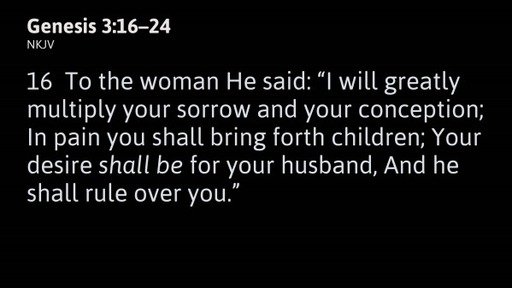Hope for the Fallen

Hope for the Fallen
1. The Curse - vs. 16-19
God’s judgments would fall on the very center of the woman’s existence. But in those judgments there was grace. Nothing would satisfy her but God. And Jesus’ gracious words often would have powerful appeal to such needy hearts: “Come to me, all who labor and are heavy laden, and I will give you rest” (Matthew 11:28).
Here we must observe that in the same way that “the woman’s punishment struck at the deepest root of her being as wife and mother, the man’s strikes at the innermost nerve of his life: his work, his activity, and provision for sustenance” (Von Rad). The “pain” that verse 17 describes as Adam’s lot is the same word twice used for the woman’s “pain” in verse 16. Both of them would experience perpetual pain in the centers of their existence.